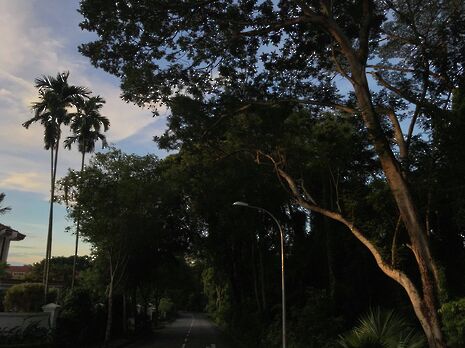“The first time I really reckoned with my homesickness was when I was transcribing something I’d written over the holidays. There was something about seeing the significance of individual things in my construction of home, those sights and sounds, that made me begin to cry.”
We sit at a modest desk at the Waterstones café. A glint of sunlight cracks through the window, casting an orange glow over a frothy mocha and fingers prying at the surface of a blueberry muffin. I am chatting with Tan Jing Min (Homerton, first year Law student) about how she felt upon returning to Cambridge after spending the Christmas break in Singapore.
Home is “when your external surroundings and interiority kind of meet, when there is no dissonance between the two”
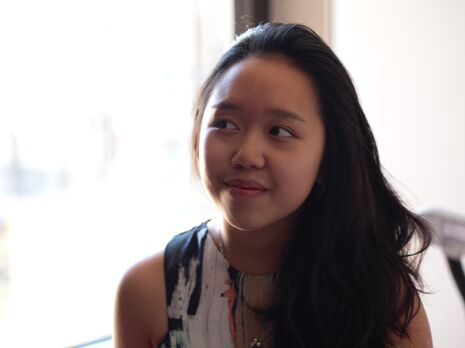
There’s a nondescript quality to Waterstones, one easily recognizable in the cafés of sprawling cities around the world. Perhaps it is unsurprising to find international students seeking academic refuge amid its relative familiarity. As our conversation persists, Jing articulates the notion that home is “when your external surroundings and interiority kind of meet, when there is no dissonance between the two.” Among the spires of churches and historic architecture of colleges, it is difficult to believe this dissonance will ever abate, particularly when for so many international students, the shape of home will always be found thousands of kilometers away.
Listen: The familiar sound of cicadas in Singapore
Cambridge can be an alienating place, beset by odd traditions and Latin incantations that insist on their own importance. For many a keen fresher, induction into this community brings a new set of dislocations. The question of homesickness is compounded as home begins to drift into the imagination. In the absence of familiar rhythms, sights, sounds and tastes, an international student can only reconstruct home in uneasy approximations and fragments of memory. Home is frozen and transplanted, mingling with the suffusion of air by the riverbanks and the ephemerality of a sunny sky.
Faces and places: the sense of home

For some, Cambridge will only remain a temporary digression from a life that awaits elsewhere. Cambridge can never dislodge an image of home that is firmly entrenched in one’s home country. It can only serve to reinforce the unwavering affection one has for home, one strengthened by the surreal sensation of scrutiny from the outside, and the constant scrutiny experienced as an outsider.
Alyssa P’ng (Sidney Sussex, third year Law student) has been in the UK for five years, having first arrived for sixth form. She describes being at a point of “saturation with life overseas,” one that manifests in visions of life back in Singapore. She recalls the familiarity of Bugis Street – the bustling cacophony of street merchants, the scent of food prepared by fastidious hawkers, the bazaar sheltered by tarpaulin.
“I feel like less of an individual in the UK. People always operate around a subconscious set of preconceptions when they see the colour of my skin”
Listen: The sound of food frying in a pan can transport one home
Like Jing, the experience of internal and external dissonance is amplified for Alyssa. “There’s a constant need for me to convince other people that I deserve to be here. I’m constantly approached by punt tour guides and stopped by porters, for example.” This need for continual assertion is absent in Singapore. “I feel like less of an individual in the UK. People always operate around a subconscious set of preconceptions when they see the colour of my skin. Nobody questions that there is a place for me in Singapore.” As one of 15 international students in her year in her college, this tenuous question of belonging continues to linger. Yet, therein lies the dilemma for many international students. Alyssa describes an associated feeling of guilt when she misses home. “I miss living in a city. There are times when I ask myself, ‘Why am I here? Why am I not home?’ But questioning the choices I’ve made is always difficult, especially since coming to a place like Cambridge is such a privilege.” There is an inscrutable quality to this pervasive unease, a growing recognition that home is the feeling that emerges when your surroundings affirm who you are.
Jennifer Guan (Pembroke, third year HSPS student) describes homesickness as “鼻子酸,” or a soreness in the nose that precedes tears. It is a sudden and wrenching sensation, one that falls shy of nostalgia. Growing up in Shanghai as an international school student of Chinese descent, Jen’s experience of homesickness is wedded more to her family than a particular place. “There’s something about the fragility of home that makes me really homesick.” Home will never be as she once left it – many of her friends have left China since completing high school. With most of her friends studying abroad in the United States, every trip back to Shanghai has entailed a return to a city devoid of those friendships. Her brother’s growing up has further diminished the image she had of home. “He used to rely on me a lot, and there’s something about not being there for him at a time when he’s growing the most that gets to me.”
“I remember being at home over the break. I was sitting in the kitchen and watching my parents cooking dinner together. They were so confused to find me tearing up when they turned around”
Since her first year, Jen has opted to return to Shanghai between terms. “It’s always a place I want to go back to and every trip is a reminder of how quickly time passes. I feel it so acutely every time I see my brother and realise he’s a little taller, or when I see more white hair on my parents’ heads.” Though Jen describes her growing recognition of different values and conceptions of fun, both with British and mainland Chinese students, the shape of home never quite dissipates. This confluence of cultural liminality and homesickness has defined Jen’s Cambridge experience. “I remember being at home over the break. I was sitting in the kitchen and watching my parents cooking dinner together. They were so confused to find me tearing up when they turned around.”
The intuitive association of home and place is echoed by Muhammad Farouq Osman (Wolfson, MPhil Public Policy), who is also from Singapore. This is his first year abroad, an experience that has induced a sense of distance from cherished memories. “It’s bittersweet,” he says, “sweet to be learning to live independently for an extended period of time in a foreign country. But it’s bitter because of the things I miss about Singapore.” It is the routines of each day that Farouq misses – passing by Teck Whye and Siglap on the bus to work, meals shared with his family at home, and the routines of prayer and breaking fast at his neighbourhood mosque.
“It was such a relief being able to speak Malay with him”
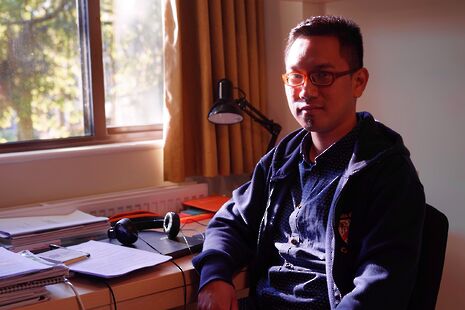
This sense of yearning has been heightened with the approach of Ramadan. It is perhaps compounded by the fact that Farouq is the only ethnic Malay in his college, an alienation eventually broken by the arrival of a Malay press fellow. “It was such a relief being able to speak Malay with him,” Farouq notes with a smile. Despite the magical quality of Cambridge and its traditions, as Farouq describes, it can never quite recreate the things that define his experiences of home. Yet, it is his sense of purpose and conviction that has helped to stave off homesickness. “The world is much bigger than Singapore. Coming here and being able to meet people from all over the world has been life changing. I will miss being here.”
Tracing spaces: reconciling homes
With his fourth year in the UK approaching, Edgar Lee (Wolfson, second year Law student) from Singapore remarks that adjusting to life in Cambridge has not been as alienating as when he first arrived for boarding school. In the aftermath of national service, Edgar remarked that returning to the UK brought a new set of affections for home that he did not have before. “My homesickness comes in bouts,” he says somewhat wistfully. “I think of the feeling of homesickness as being very sour. It’s like a pang, or a sharpness that comes.”
“I think of the feeling of homesickness as being very sour. It’s like a pang, or a sharpness that comes”
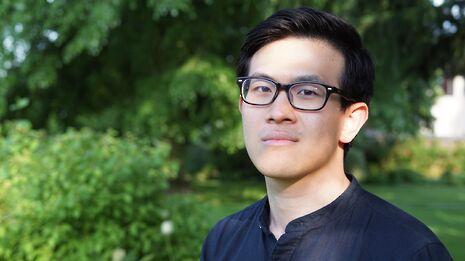
For Edgar, the challenge of being geographically displaced is the burgeoning disengagement one feels with the lives of friends at home. “Hearing about something someone has gone through is different from being with them throughout those experiences.” This feeling of distance inevitably arises through social media updates – Edgar describes it as the intense feeling of FOMO, or the fear of missing out. There is a frustrating helplessness one contends with as seminal moments in the lives of friends and family slip away. Yet, he holds on to something precious in those moments of loneliness. “I bring a box with me wherever I go. It’s filled with cards from friends and photos of my loved ones. They’re like bookmarks from different points in time.” In the absence of physical and emotional presence, keepsakes are enough to bring one back to specific memories and points in time. The fragments of home come together, however momentarily, in the imagination.
“The thing about the breaks here is that they’re long enough for you to get used to home again. There’s always a shock that accompanies the start of term, especially on the days when I wake up and forget that I’m in Cambridge.” Kelly Wing (Trinity, first year Linguistics student) spent 14 years at an international school in Hong Kong. Uprooting everything to move to Cambridge brought a sense of shock, of adjusting to a place bereft of the familiarity of friends and family.
“I think I tend to romanticise home. I think a lot about whether I would’ve been happier staying”
“I think I tend to romanticise home. I think a lot about whether I would’ve been happier staying.” Kelly’s wistfulness stems from the various tensions she’s straddled – she’s the only person from Hong Kong in her year on her course, an international school alumnus detached from the experiences of those who attended Hong Kong’s local institutions, and an international student disconnected from British political discourse. With many of her friends heading to North America or remaining in Hong Kong to attend university, her homesickness is pegged to an ambivalent curiosity towards what could have been. “Homesickness is like a gnawing emptiness when you ignore it. It’s always bubbling, but it all sort of comes out when I’m really stressed.” It’s an experience she finds difficult to share with her fellow students from the UK. “I’ve come to compartmentalise two aspects of my life – Hong Kong and Cambridge.” This dissonance continues to linger each day, but as Kelly notes with a touch of pensiveness, “Things will never be the same even if we all go back to Hong Kong.”
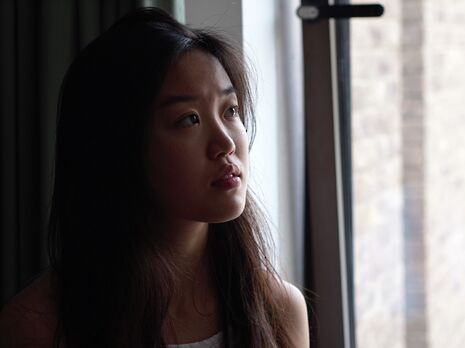
While social media can serve as an abject reminder of distance, it can also serve to bridge it. The latter is the case for Cyrus Chan Ming Tat (Robinson, MPhil Architecture and Urban Design), for whom Hong Kong never feels too far away. “Reading Hong Kong news always makes me feel close to Hong Kong. I don’t feel the same about local news.” In some ways, the sense of that has helped to provide Cyrus some ease of mind, whether by Skyping his family or staying updated with Hong Kong’s political scene. Being in Cambridge has helped Cyrus become attuned to particular cultural distinctions. “I remember one time I was at Sainsbury’s at the cashier’s and I put my groceries down quickly. The old lady in front of me apologised for moving slowly!” The pace of life is much slower here: you can have a chat with the cashier or greet people on the streets. Returning to Hong Kong to conduct his fieldwork induced an acceleration of his lifestyle.
“Strong relationships always take a long time to develop, regardless of how they begin”
Beyond these cursory observations, Cyrus notes that homesickness tends to set in during moments of sheer mundanity. While there are fragments of home in Cyrus’ room, such as a wall of photographs and Lego Star Wars displays, he attributes the communities he’s found here as a chief source of joy in combating those dreary feelings. He divides his time between friends from college, church, and the Cambridge Chinese Christian fellowship. “Strong relationships always take a long time to develop, regardless of how they begin.” But he adds with a grin, “Sometimes when I feel bored or lonely, I’ll call friends from home in the middle of the night, just before they go to work.”
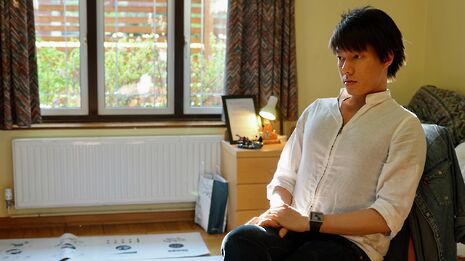
The passage of time can induce a blurring of the edges separating Cambridge and one’s home country. The duration spent away from home can erode a sense of rootedness, particularly when circumstances demand a constant shuttling between two spaces. The relationships one maintains from home can never retain the intimacy demanded by a permanent physical presence. The challenge of reconciling old and new conceptions of home persists, however tangentially, as the weeks of term continue to unfurl and pass by.
Reclaiming spaces: forging home
While many continue to reach back toward an idealized image of home, many have embraced Cambridge as a place in which new affections, familiarity and memories can be forged. The process of laying new roots is not seamless, and the gradual shifting of the shape of home can be imperceptible. But one may begin to wake up to a comfort that transcends the unease of displacement.
Jay Ojha (Sidney Sussex, third year Law student) believes that there is hypocrisy to his homesickness. “I have too realistic a picture of home to feel homesick,” he remarks, eschewing romantic notions of his home city, New Delhi. He acknowledges the privilege with which he grew up in India – the supportiveness of his family and a brother who had gone before him to study in Oxford. This resulted in a disconnection from New Delhi itself, a feeling of being too socially liberal for India.
“I was enthralled when I first got here. I loved the academic scene and its intellectual rigour”

“I was enthralled when I first got here. I loved the academic scene and its intellectual rigour. It fulfilled every expectation I had of it before I arrived.” It is within this environment that Jay has established a new vision of home. As he has grown more at ease in Cambridge, the vision of New Delhi as home has begun to recede. With graduation looming and aspirations to practice corporate law in London, Jay remarks that his decision to carve out a life here will not be without its drawbacks. “To work for the civil service is always an option for Indians who study abroad. It’s always been a question of responsibility, of whether or not I want to go back and have an impact on the lives of people at home, or if I want to stay on and enjoy life in London. The clarity of choice comes down to the kind of lifestyle I want to have.”
Aaron Tam (St John’s, third year Economics student) is also looking to remain in the UK after graduation. With a career in economic consulting waiting, he has opted to move on from Hong Kong for now. “During my first summer back, I began to compare Hong Kong to Cambridge, and it drew my attention to the fact that I’d begun to enjoy the pace of life in Cambridge. It was a big contrast living in a small town as opposed to a big city.” This sense of gradual appreciation was coupled with the surreal sensation of living in the sort of place he’d always dreamed about. This does not mean that homesickness does not surface from time to time.
Aaron describes these shocks as the silence that lingers after he hangs up from Skype with his parents and closes his laptop
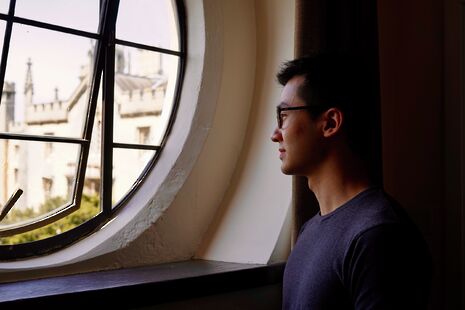
“It hits once or twice a term. It usually spikes when I have a bad day, or it could be something that randomly triggers an old memory.” Aaron describes these shocks as the silence that lingers after he hangs up from Skype with his parents and closes his laptop. These moments have grown rare as the UK has begun to take on the shape of home. His foothold in Hong Kong’s political activity has loosened as he has become more deeply immersed in political developments in the UK and around the world. Yet, something continues to tug at him. “I think I’ll return to Hong Kong eventually because of my friends and family. I really have no clear idea of how things will be yet.”
“Home is a relative experience,” opines Emily Ho (Christ’s, first year Law student). “I do get homesick. I miss going to mamaks with my friends and eating prata and waking up to my family. But I’m also grateful to be studying overseas at such a historic place. There’s beauty about my home, but Cambridge is home for other people, and I want to see the beauty that they see.” Emily is determined to return to Malaysia after graduation to work with disenfranchised ethnic groups. It is the knowledge of her return that has emboldened her endeavour to see Cambridge as home. “I’d visited the UK with my family before, so I wasn’t too uneasy when I came here. As soon as I recognised Cambridge as my second home, the assimilation came quite naturally.”
“As soon as I recognised Cambridge as my second home, the assimilation came quite naturally”
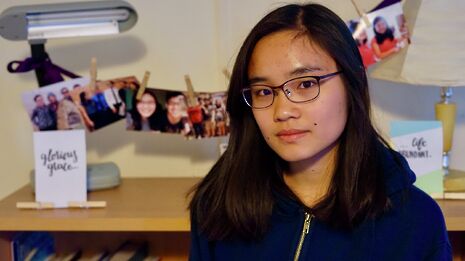
Despite initial encounters of unfriendliness in her college and faculty, she quickly immersed herself in life here. Emily spends her time serving on the worship team of her local church, enjoying the company of her friends from college and helping out at the Cambridge Inter-Collegiate Christian Union. This is underpinned by a sense of conviction to make the most of her time here before returning to Malaysia for good. She admits that her sister, who’s currently pursuing a master’s degree, and her boyfriend, who arrived in the UK a year before her, were instrumental in helping to prime her for the experience of moving abroad. Amid those moments of stillness, there remains the assurance that Malaysia will be there to welcome her in a warm embrace. In the meantime, Cambridge is the home she will continue to cherish.
***
All international students find themselves mired in dissonance – of a mental construction of home not being matched by the immediacy of material surroundings. For Arjun Dhar (Downing, first year Law student), this is not the first time he’s grappled with such feelings. His parents moved from India to Singapore before he was born and as he grew up, instilled in him that he was “Kashmiri to the core.” However, when he thinks of home, what arises instinctively is the boardwalk along Marina Bay Sands, the intermingling of light and dark in the cityscape, the greenery that dots the roads around his neighbourhood.
“However much I may think of Singapore as home, coming here has made Cambridge a part of me as well”
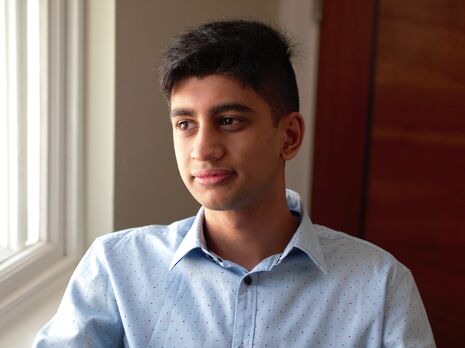
As he thinks a little longer, images of Downing College begin to enter his mind. “Both Cambridge and Singapore are home for me,” he remarks with a glowing affection. “It’s funny – I had more of a sense of having to justify me being in Singapore rather than being here.” Arjun acknowledges that amidst his friends in college, he becomes a different person. “I feel like I’m 18 again. I let go of a lot of mental baggage when I’m with my college friends.” Yet, small things transport him back to Singapore: the pattering of light rain, the stray glimpses of sunlight. “There will always be parts of places that stay with you,” he remarks wistfully. “However much I may think of Singapore as home, coming here has made Cambridge a part of me as well.”
We pause for a moment. The midday sunlight falls over the traffic weaving through the narrow road besides Sarvino’s. The pedestrians trickle by – parents with children, teenagers on an afternoon out, students in various states of frenzy making their way to C-Sunday. Downing is a little down the road. For me, Wolfson is a little bit further. There’s an unspoken acknowledgment that each day in Cambridge has been slightly odder than the day before.
“What are the things here that have changed you?”
Neither of us imagined we’d find ourselves here during evenings on school benches imagining where life would bring us after national service. A particular set of factors – loving families, supportive teachers, immense privilege and the warmth of friendship – has brought us to this town whose name takes on a cosmic transcendence when uttered back home. But in this moment, we are the beneficiaries of a place to which we can affix the label home. Just as we’d grown in Singapore, we’ve continued to grow in Cambridge. In incorporating them into how we conceive of ourselves, we have merely attempted to be honest in describing how our lives have panned out. Arjun asks me, “What are the things here that have changed you?”
The interviewer becomes the interviewee. My mind swirls with stories of what constitutes the shape of home.
